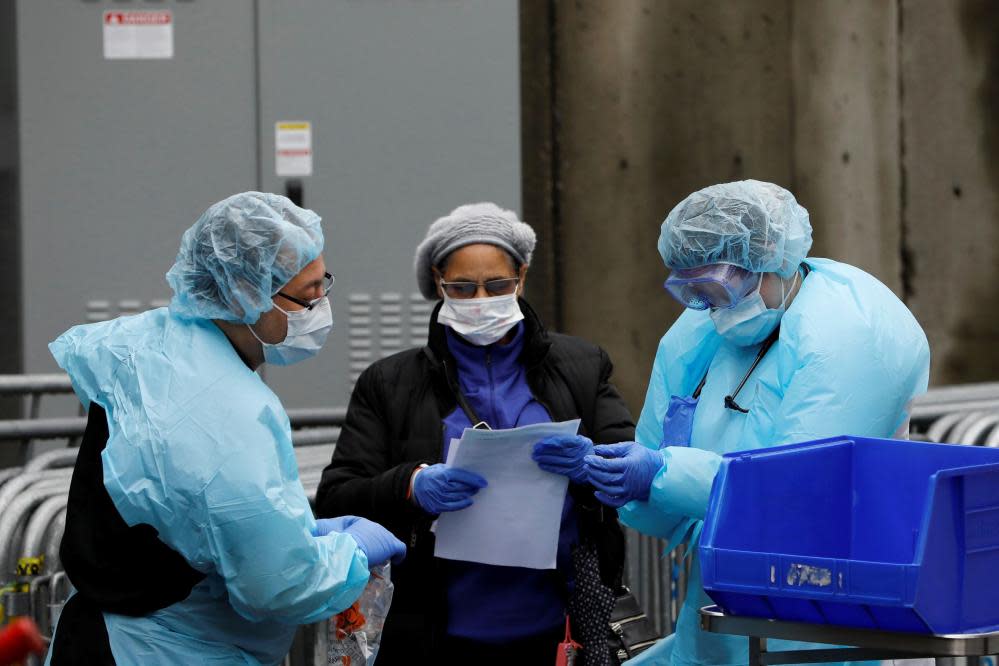Medical staff beg for masks on social media amid coronavirus crisis

Doctors, nurses and other frontline health workers in the coronavirus crisis are faced with a critical lack of personal protective equipment and have taken to begging for equipment online, using the Twitter hashtag #GetMePPE.
The shortages have been devastating. Seamstresses have been asked to make masks for hospital workers. As one hospital’s equipment supply diminished, one anesthesiologist wore a plastic bag over his head during a procedure. Construction companies have been asked to donate existing supplies of respirator masks.
Doctors and nurses even started a crowdsourcing website to accept and distribute donations – GetUsPPE.org. Medical students in New York City are soliciting donations through PPE2NYC.org.
“There are dwindling supplies of N95 respirators, isolation gowns, isolation masks, surgical masks, eye protection equipment, intensive care unit (ICU) equipment and diagnostic testing supplies in areas that had the first community outbreaks,” a lobbying groups for nurses, doctors and hospitals said in a letter to congressional leadership on Thursday.
This is an anesthesiologist, Dr. John Henao, who is running out of PPE (personal protective equipment) at his hospital. He, like most of us, are currently working under the assumption that most people are Covid19 positive and asymptomatic, but in order to #getmePPE pic.twitter.com/VVNUdQfutb
— Lisa Miller, MD (@thedelports) March 20, 2020
Neighbors of nurses and doctors are leaving masks on doorsteps as a donation. Healthcare workers are isolating from family members within their own homes. Some workers are considering renting separate apartments.
The desperate need for appropriate protective gear has led some to remind people of another limited and vital resource: healthcare workers themselves.
This is what it looks like in the ICU. Rows of brown bags each labeled with the name of a nurse or doctor . We are told to keep and reuse these masks , which under normal conditions would be thrown out each time we leave the isolation room. #GetMePPE pic.twitter.com/8blP8LzAGv
— Victoria (@V_Q_W) March 19, 2020
“We’re bracing for the potential of having up to 30-40% of healthcare workforce step out of care at a given point of time,” said Dr Kelly Cawcutt, a critical care doctor and association director of infection control at one of the nation’s foremost infectious disease hospitals, the University of Nebraska Medical Center.
When you get sick and have to come to the hospital, I assume you want a doctor and nurse to take care of you.
If we are forced to keep reusing masks or run out of them, there may not be enough of us left. #GetMePPE for #COVID19 pic.twitter.com/DWicKnu5J7— Jahan Fahimi (@JahanFahimi) March 19, 2020
“Do I think we’re going to see a surge of patients? Yes. Are we concerned we could surge past capacity we have if we don’t do social distancing? Yes. And how long could it last? I think we’re all bracing for weeks and months of this,” said Cawcutt. “It all depends on how quickly the infection spreads and how well the mitigation strategies work.”
Doctor’s log. Helldate 2020. It has been 2 months since #COVID19 hit the U.S. Several healthcare friends are ill with it. Without personal protective equipment, we wonder who’s next. The cavalry is not coming, so we are starting our own solutions: https://t.co/7LeMgLT9YK
— Esther Choo (@choo_ek) March 23, 2020
Donald Trump said he would invoke the Defense Production Act to corral private business into making “millions” of masks, but it remains uncertain whether the administration has gone beyond a simple proclamation. So far, formal agreements with private business to make more personal protective equipment have not materialized, and whether those efforts are ongoing is unclear.
This is my allotted #PPE for who knows how long #GetMePPE pic.twitter.com/uciHblZqvR
— Sarah ES Jeney, MD (@_sarahesteele) March 23, 2020
The US Centers for Disease Control and Prevention has already published crisis guidelines, which include workers potentially wearing homemade masks. In New York City, healthcare workers have been instructed to keep working, even if they have had high-risk exposure to coronavirus patients.
“The scary part is that we’re seeing hospitals say they don’t have enough PPE,” said Cawcutt. “Right now, do we have PPE? Yes. Do we have enough to get through the entire span of time? I don’t know yet.”


